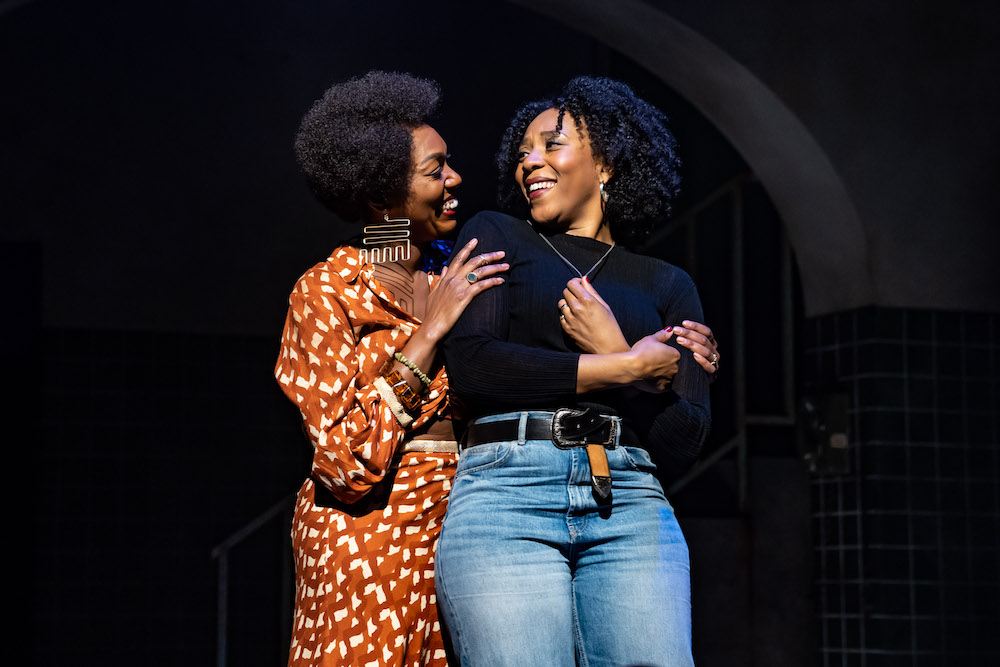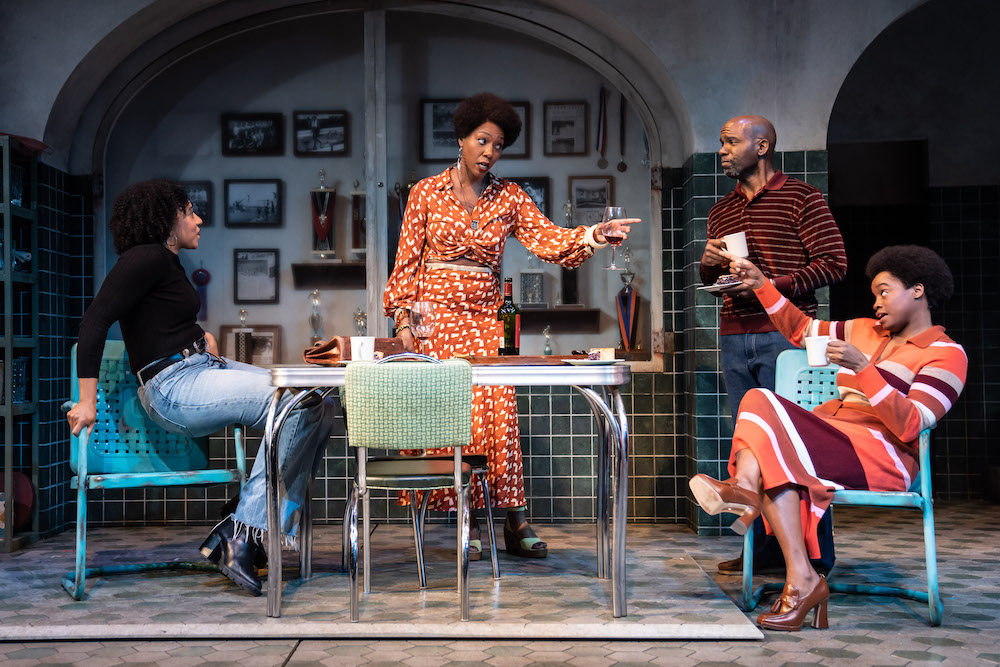
“Water is a complicated element. It heals, destroys, rescues, erases. It drowns. It saves. It holds memory. It washes away pain….” That statement by Janice, the narrator in the ripple, the wave that carried me home, is a dramatic summary of the play itself. Directed by Jackson Gay, the play by Christina Anderson is now on stage in a world premiere co-production at Goodman Theatre with Berkeley Repertory Theatre.
As a Black girl and teenager, Janice (Christiana Clark) learns to swim from her swim coach mom, Helen (Aneisa Hicks). The facilities manager at a white pool in a nearby town lets them use the pool before the white swimmers arrive. Helen drives 45 minutes each way to teach her daughter to swim. Janice loves the water then—but changes her mind later.
The ripple, the wave is a play about water, about the freedom and lightness of swimming. The scenic design focuses around a swimming pool—its edge is just in front of the stage. The play is also about racism, because segregated swimming pools have a long and ugly history in America; the story is based on a swimming pool desegregation battle in Kansas City in the 1950s. The play moves back and forth among several time periods—1956, 1973 and 1992.

In the ripple, the wave, the swimming pools in the fictional 1950s town of Beacon, Kansas, are segregated. Black residents have nowhere to swim; Black kids have nowhere to learn to swim. Janice’s father, Edwin (Ronald L Conner), a leader in the fight for a pool, tells his daughter a story about his boyhood. Edwin and three friends found a way to sneak into a white pool. Reggie, the best swimmer, dives in and takes a brief swim before they are all chased away. Edwin tells how the pool was closed for three days so it could be drained, sanitized and refilled. Because a Black kid swam there for 30 seconds.
Edwin’s activism and leadership in the swimming pool campaign eventually results in a swimming pool for Blacks in Beacon. But even once Black pools were opened, they were usually less well-kept and less well-funded. “Separate but equal” pools. (Goodman’s playbill includes a helpful article on pools and politics by dramaturg Neena Arndt.)
Other incidents of racial injustice dramatize the play’s themes. Janice and her mother Helen are stopped by a highway patrolman while driving home from one of her swimming lessons; the cop demands that Helen get out of the car. The incident is traumatic for the whole family. In 1992, the Rodney King trial verdict and the protests that follow play in the background.
The fourth character in Janice’s family is Aunt Gayle (Brianna Buckley). She and Janice have a warm and loving relationship that comes through strongly in their interactions and in Janice’s stories about her aunt. Buckley also plays the character known as Young Chipper Ambitious Black Woman, who phones Janice frequently to request that she appear at the naming ceremony that will dedicate Beacon’s new indoor swimming facility to her late father. For most of the play, we only know Young Chipper as a disembodied voice but she and Janice eventually meet in person when Janice returns to her home town.

And then there’s the matter of being the only one. All Black women must know what it’s like to be “the only one.” In the ripple, the wave, Janice was the only Black girl to swim in the forbidden white pool. When Janice talks to Young Chipper about her job and her office, she asks, “Are you the only one?” Young Chipper hesitates briefly and says, “yes.” Janice comments that she’s not the only one at her workplace but she’s the only director and thus is the only one at weekly staff meetings. And as Janice travels home in 1992, the Rodney King trial verdict is announced; Janice is the only Black woman in the terminal. And she’s the only Black woman on the plane.
Aunt Gayle gives Janice this reality check: “Is this your first time in America? Let me show you around ....” The only-ness of Blackness is the current below the water line in Anderson’s play.
Anderson’s play is beautifully written and staged by Goodman. Clark is delightful—by turns serious and playful—as Janice as child and adult. But notwithstanding Gay’s careful direction and competent cast, the play lacks a certain magic to make it great. It also drags in the last half; it could use a 10-15 minute trim.
The ripple, the wave set (and its swimming pool) are designed by Todd Rosenthal with lighting design by Jason Lynch. Sound design is by Noel Nichols & UptownWorks. Costumes are by Montana Levi Blanco. Movement is by Erika Chong Shuch.
The play runs 105 minutes with no intermission and continues through February 12 in Goodman’s Owen Theatre, 170 N. Dearborn St. Tickets are $15-$45 for performances Tuesday-Sunday.
